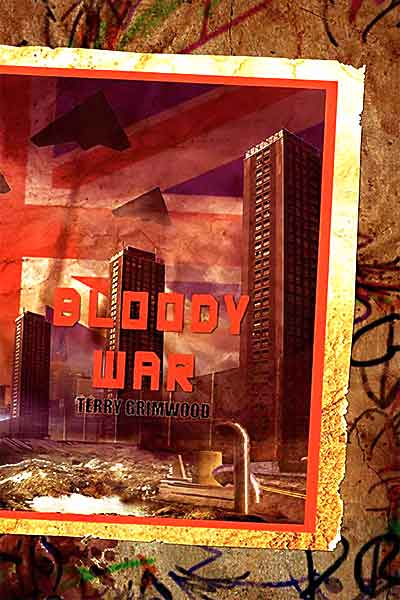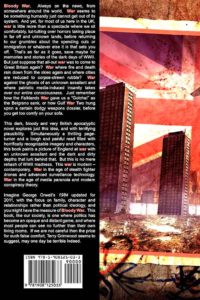 By TERRY GRIMWOOD (Eibonvale Press; 2011)
By TERRY GRIMWOOD (Eibonvale Press; 2011)
Reading this quintessentially British apocalyptic nightmare, two things immediately became apparent: 1). The English have the market cornered on dystopian narratives, and 2). In recent years such fiction has grown extremely wimpy. This is to say that BLOODY WAR makes for a strong post-9/11 addition to the English-centric likes of BRAVE NEW WORLD,1984, A CLOCKWORK ORANGE and V FOR VENDETTA in its pitiless vision of a catastrophic war that destroys England (and, it’s implied, much of the rest of the world), a vision that in grit and sheer bleakness far outdoes most every other recent fictional dystopia.
BLOODY WAR makes for a strong post-9/11 addition to the English-centric likes of BRAVE NEW WORLD…
It tells the story of Pete, a Londoner who finds his comfortable life thrown into turmoil upon learning of a war his country is fighting against a shadowy force known only as the EoD, or Enemies of Democracy. Nobody seems to know exactly who the EoD are or where they come from, only that they apparently want to do everyone in. A similar confusion besets Pete about the war his government is waging, which everyone seems to know about but him.
Its sense of realism is unerring and impressive, but it’s that very attribute that makes the proceedings so devastating.
 Pete quickly grows acclimated to this new reality upon learning of the draconian security measures adopted by the government and narrowly surviving a bombing that takes out much of his workplace. Most alarming, however, is the discovery that his teenage son has been drafted. This latter fact is especially troubling to Pete after he’s told horror stories about young men joining the military and never coming home. Pete arranges for his son to be shot in the foot so he’ll be useless to the military, and sets up an outdoor picnic for just that purpose.
Pete quickly grows acclimated to this new reality upon learning of the draconian security measures adopted by the government and narrowly surviving a bombing that takes out much of his workplace. Most alarming, however, is the discovery that his teenage son has been drafted. This latter fact is especially troubling to Pete after he’s told horror stories about young men joining the military and never coming home. Pete arranges for his son to be shot in the foot so he’ll be useless to the military, and sets up an outdoor picnic for just that purpose.
If the above sounds downbeat, be advised that it’s merely a warm-up for the unpleasantness to come. The planned shooting of Pete’s son doesn’t quite go off as planned, but then not long after the deadly picnic his entire family is killed, leaving a dazed Pete to traverse an increasingly hostile environment by himself. Along the way he’s forcibly conscripted into fighting the EoD and meets several traveling partners—who in keeping with the narrative’s grim tenor all die horribly, while Pete somehow remains alive. We eventually learn there’s a very definite reason for that, and for everything that has befallen poor Pete, but by that point his sanity is in about the same condition as the blitzed landscapes around him.
If the above sounds downbeat, be advised that it’s merely a warm-up for the unpleasantness to come.
This, needless to say, is not a pleasant book. Its sense of realism is unerring and impressive, but it’s that very attribute that makes the proceedings so devastating. The actions of the corrupt authorities and the shadowy EoD are not at all unconvincing in these days of terror alerts and mass rioting in London (in light of which BLOODY WAR seems far more topical than it did when it was initially published). So too Pete’s befuddled mental condition: he finds it difficult to properly mourn his loved ones or even think clearly amid the unceasing onslaught of explosions, gunfire, blood, falling debris, severed body parts and dashed hope, all vividly portrayed and anything but comforting.
See Also: AFFAIRS OF A CARDIOVASCULAR NATURE
